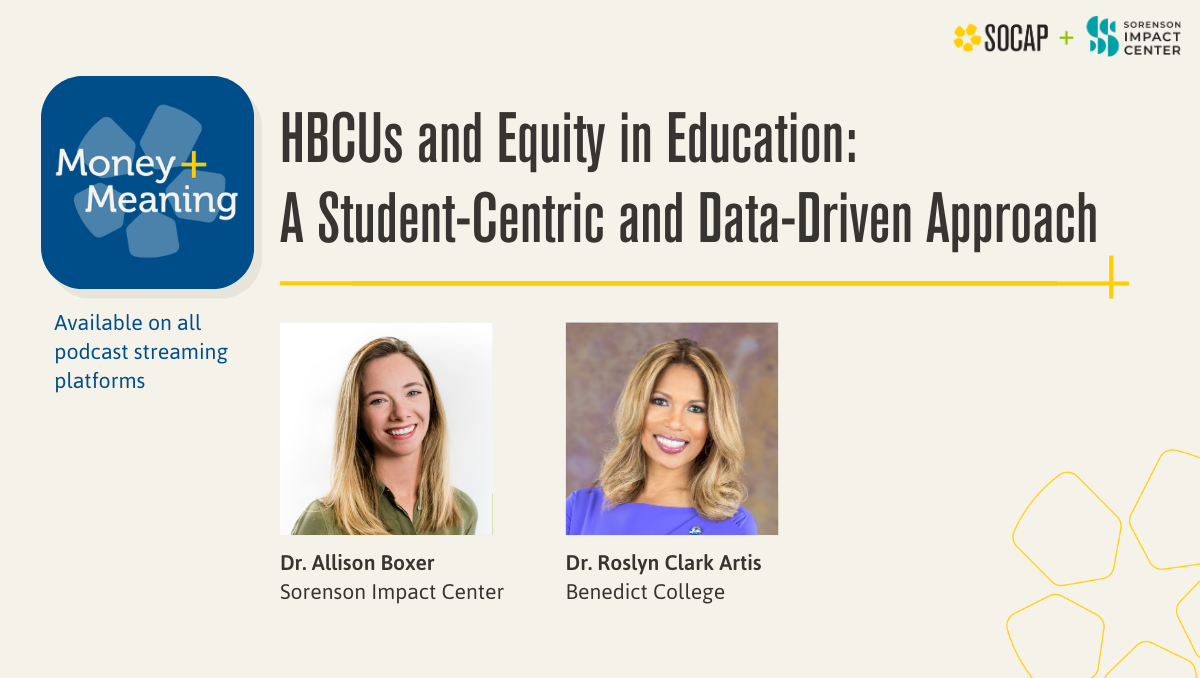“Benedict has a firm commitment to ensuring both affordability and accessibility of education. And accessibility for us really means providing all of those wraparound services that our students most need to be fully successful.” — Dr. Roslyn Artis
This episode of Money and Meaning is a recording of an onstage conversation at SOCAP22 between Dr. Allison Boxer, Managing Director of Sorenson Impact Center, and Dr. Roslyn Artis, President and CEO of Benedict College. Benedict College is a partner in Sorenson Impact Center’s MAPS Project. Using data and a student-centric approach, the MAPS Project aims to help higher education institutions adapt to changing enrollment trends, better serve the needs of more diverse student bodies, and work toward equity in education.
“We’re really looking to talk about why higher education needs data-driven investment and why investors should look at schools doing innovative things, like Benedict College.
Dr. Allison Boxer
Benedict College in Columbia, South Carolina, is among the highest-ranked historically Black colleges and universities, or HBCUs, in the Southeast. “Benedict was founded in 1870. … Our primary purpose is to educate descendants of former slaves. Our campus is located on what was an 80-acre slave plantation. … Today, the institution largely educates a population of low-wealth, first-generation students of color,” Dr. Artis shared.
In this episode, Dr. Artis and Dr. Boxer discuss opportunities and challenges at Benedict College, The MAPS project, and how innovative financial structures can help HBCUs support students on a path toward academic and professional success.
It starts with a closer look at what students really need. “We began to get a deeper understanding of the individual stories of our students. … The MAPS Project and Sorenson came along at a very important time at Benedict College. … We started to think deeply about how we fully serve the needs of our students: Food pantries, clothing closets, toiletries pantries, we provide bus passes for our students. We are committed to affordability for our low-wealth student population,” Dr. Artis said.
Benedict has partnered on the MAPS Project with the Sorenson Impact Center. As Dr. Boxer explains, MAPS stands for Model, Analyze, Prototype, and Share. Through MAPS, the goal is to equip decision-makers in higher education with the tools they need to create a more equitable system. “Our data work has shown that enrollment is much more complex than just birth rates. The landscape is really changing, and that means the classroom of 2032 is going to look very different than the classroom of today in 2022,” Dr. Boxer said. “The effects of declining enrollment won’t be experienced uniformly across different demographics. Race, place, and income will all have an impact. Specifically, Black or African-American students, students living in rural areas, and low-income students will be the most severely impacted by this unequal distribution of declining enrollment.”
In this conversation, Dr. Boxer and Dr. Artis explore how data can help provide a more equitable path forward for how we fund and provide higher education. Enjoy the conversation!
Listen to the Full Conversation on HBCUs and Equity in Education:
Don’t miss out! Subscribe to Money + Meaning on Apple Podcasts, Stitcher, TuneIn, Spotify, or anywhere else you find podcasts.
Listen to more episodes of Money + Meaning here.
Money + Meaning is the official podcast of SOCAP. The series aims to expand the conversation around impact investing and strategies to finance and support social change while stimulating innovative and valuable new partnerships across sectors.






